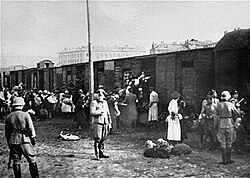| Revision as of 08:20, 7 August 2011 view source173.49.253.243 (talk)No edit summary← Previous edit | Revision as of 15:10, 6 September 2011 view source Michaeldsuarez (talk | contribs)7,715 edits Fixing.Next edit → | ||
| Line 4: | Line 4: | ||
| In ], the '''''Umschlagplatz''''' ({{lang-de|collection point or reloading point}}) in the ] was where Jews gathered for deportation to the ]. | In ], the '''''Umschlagplatz''''' ({{lang-de|collection point or reloading point}}) in the ] was where Jews gathered for deportation to the ]. | ||
| During the ], beginning on July 22, 1942, Jews were deported in crowded freight cars to Treblinka. On some days as many as 7,000 Jews were deported. An estimated 265,000 Warsaw Jews were taken to the Treblinka gas chambers |
During the ], beginning on July 22, 1942, Jews were deported in crowded freight cars to Treblinka. On some days as many as 7,000 Jews were deported. An estimated 265,000 Warsaw Jews were taken to the Treblinka gas chambers,{{Fact}} and some sources describe it as the largest killing of any single community in World War II. The deportations ended on September 12, 1942. | ||
| The ''Umschlagplatz'' was created by fencing off a western part of the ] freight train station that was adjacent to the ghetto. The area was surrounded by a wooden fence, replaced later by a wall. Railway buildings and installations on the site as well as a former homeless shelter and a hospital were converted to the prisoner selection facility. The rest of the train station served its normal function for the rest of the city during the deportations. | The ''Umschlagplatz'' was created by fencing off a western part of the ] freight train station that was adjacent to the ghetto. The area was surrounded by a wooden fence, replaced later by a wall. Railway buildings and installations on the site as well as a former homeless shelter and a hospital were converted to the prisoner selection facility. The rest of the train station served its normal function for the rest of the city during the deportations. | ||
Revision as of 15:10, 6 September 2011


In the Holocaust, the Umschlagplatz (Template:Lang-de) in the Warsaw Ghetto was where Jews gathered for deportation to the Treblinka extermination camp.
During the Grossaktion Warsaw, beginning on July 22, 1942, Jews were deported in crowded freight cars to Treblinka. On some days as many as 7,000 Jews were deported. An estimated 265,000 Warsaw Jews were taken to the Treblinka gas chambers, and some sources describe it as the largest killing of any single community in World War II. The deportations ended on September 12, 1942.
The Umschlagplatz was created by fencing off a western part of the Warszawa Gdańska freight train station that was adjacent to the ghetto. The area was surrounded by a wooden fence, replaced later by a wall. Railway buildings and installations on the site as well as a former homeless shelter and a hospital were converted to the prisoner selection facility. The rest of the train station served its normal function for the rest of the city during the deportations.
In 1988, a stone monument resembling an open freight car was built to mark the Umschlagplatz. The monument was created by architect Hanna Szmalenberg and sculptor Władysław Klamerus.
External links
52°15′08″N 20°59′21″E / 52.2523083333°N 20.9890777778°E / 52.2523083333; 20.9890777778
This Warsaw-related article is a stub. You can help Misplaced Pages by expanding it. |
This article related to the Holocaust is a stub. You can help Misplaced Pages by expanding it. |